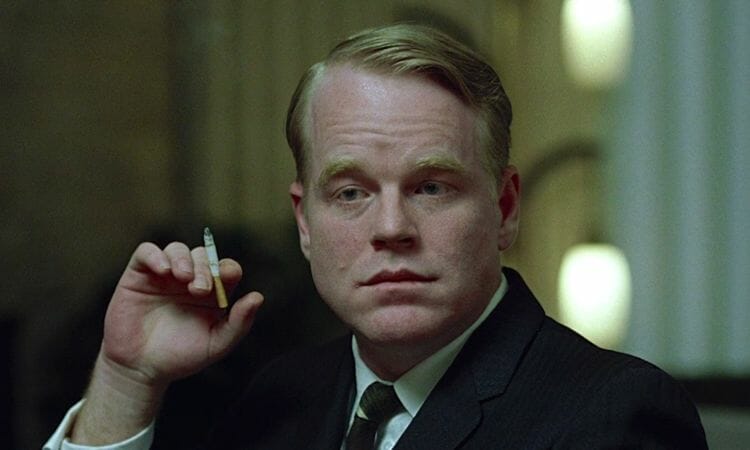By Carrie Stemke · October 4, 2014


Capote is a beautifully crafted, mesmerizing film that perhaps best demonstrates the late Philip Seymour Hoffman’s ability to effortlessly become his characters. The film tells the story of the 1959 murder of a Kansas family that sparked the idea for author Truman Capote’s famous true crime novel, In Cold Blood, and follows Capote as he researches the book and develops a relationship with one of the two murderers.
Through Philip Seymour Hoffman, the audience can see all the facets of the real Truman Capote’s personality: his genius, his arrogance, his compassion, his self-absorption and need for attention. Hoffman portrays his character with beautiful subtlety and emotion. Through him, we see a Truman Capote who is moved to tears by applause and attention, who is in his element when surrounded by admirers, and whose rabid determination to get to the bottom of the story and self-centeredness overrides everything else in his life, including his personal relationship with lifelong friend Harper Lee (Catherine Keener) and partner Jack Dunphy (Bruce Greenwood). Instead, the portion of Truman’s attention not focused on himself is largely absorbed by Edward Perry Smith (Clifton Collins, Jr.), one of the two murderers involved in the case. The relationship between the two men is fascinating to watch, as it moves unsteadily back and forth between something close to friendship and a manipulation on both sides. At times, Perry seems to believe that Truman is his friend (and indeed, he refers to him as “amigo” in letters), and at others, he appears to be using Truman for his own ends without trusting him. Collins is convincing, heartbreaking even, in portraying a man who is a perfect complement to Truman Capote in that he is a contradiction in and of himself. Truman is no better: there are moments when his feelings towards Perry seem like genuine compassion, and at other times, he is cruel and manipulative, treating Perry as though he is nothing more than a pawn in a game to get a story.
In the end, and in real life, In Cold Blood was the book Truman Capote unashamedly stated it would be: it did indeed change literature in America. But it changed Truman Capote too: after four years spent working to finish In Cold Blood, Capote never finished another book. Perhaps Perry-and his fate-hit too close to home for Truman. The film graphically portrays the murders, Perry’s death and Truman Capote’s reaction, a move calculated to remind us that we are watching the stories of real people, and that they, their imperfections, and the harsh realities of life cannot be forgotten.